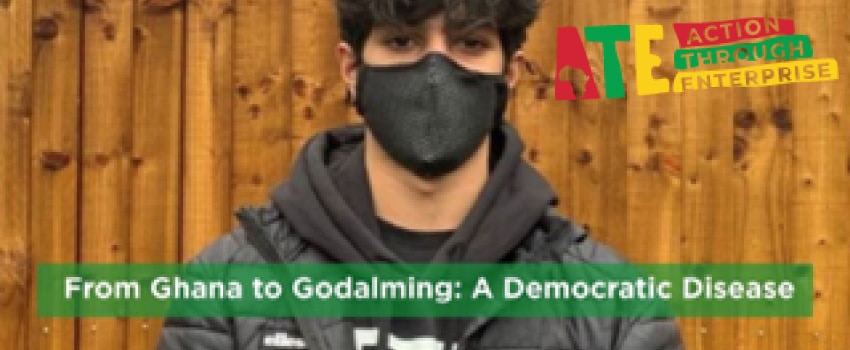
15 year old Amaan Noorani has been volunteering for Action Through Enterprise (ATE) as part of his Duke of Edinburgh Award. He’s worked directly with teenagers in Lawra to write his article – From Ghana to Goldalming: A Democratic Disease.
Amaan has been able to draw comparisons between his life during the pandemic and those of young people in Lawra, and has documented some of the impacts of Covid on their lives.
From Ghana to Godalming: A Democratic Disease (author – Amaan Noorani)
Covid-19: An International Struggle
Covid-19 has affected countless lives in more ways than we realise. Especially those who live in regions less privileged than that of the UK. Imagine how this pandemic must be affecting families in areas such as Lawra in Ghana. How different do you think the situation is over there?
The whole world has been engaged in this international struggle against Covid-19 and this has meant that for the first time in decades, over seven billion people have all feared the same thing. However, it has been through this crisis that the world has become more united and more connected than ever before, and it is because of this, that I have been given the opportunity to work with the charity Action Through Enterprise as a part of my Duke of Edinburgh Programme with my school. And I am using this as a means to gather more awareness for this fantastic charity in Ghana from my home in Godalming.
A bit about Lawra
Action Through Enterprise (ATE) primarily focuses on educating children in Lawra. The Lawra District is one of the nine districts in the Upper West Region of north Ghana which is the poorest region In Ghana. It has often been referred to as the last born of Ghana as it has very little support from the government.
• 68% of household members do not have access to or use a toilet.
Teacher to Pupil ratio in Lawra (42:1) is above the recommended rate of 33:1.
A bit about ATE
ATE believe that having access to an education alleviates poverty and restores hope to the children in Lawra for their futures. As a part of my research, I was lucky enough to speak with a number of children, teenagers, and adults in Lawra that have benefited from the amazing work that ATE do. It is these conversations that have bought home to me the stark reality between the monumental differences and some of the similarities between life in Godalming and life in Ghana living under the cloud of Covid-19.
How has COVID-19 really affected children in Ghana?
I was fortunate to be given the opportunity to speak with Kanyiri, a twentyone-year-old student in Lawra with aspirations to become a medical doctor, as well as two younger students whose ages are more similar to my own, Dery Fortunate and Dabuo Collins. I asked them all how Covid-19 has affected their lives in Lawra so that I could both compare it to my personal experiences as well as sharing my findings with you through this article.
Dery Fortunate
- I lost contact with distant friends and family members.
- So much study time was lost due to the closure of schools and that has affected my academic development.
- I was very anxious and doubtful about the future. However, I was very optimistic that things will one day become normal again.
Dabuo Collins
- Food situation was very hard.
- Covid affected all aspects of my life, academic development, and social skills development.
- I could not play my favourite game which is volleyball.
- I personally took the issue of sanitation very seriously especially the wearing of masks and washing of hands.
- I was filled with panic and fear because I thought the virus was finally going to spread to my community.
Virus impact in Ghana compared to the UK
In the early stages there was a lack of belief that the virus even existed due to the limited cases and the fact that there are very few media sources. Unlike the media frenzy in the UK which brought it to our attention very quickly with twenty-four seven news access.
Despite the scientific advice around wearing masks, many in Lawra cannot afford masks. Unlike in the UK where 53 million masks are being sent to landfill everyday (theguardian.com).
It is really challenging for many families to get access to food, even in normal times, where children are lucky to get one meal a day in Lawra, but because of the excellent work that ATE are doing many children have access to food through school lunches. However, as schools have all shut due to Covid-19, these children are back to living off one meal a day.
During this time, the government have done their best to get children and young adults the chance to do their exams, but by prioritising this, there has been no enrichment such as art or organised sport. Unlike my own personal experience and those of my friends, where we have been lucky enough to still have the opportunity to have remote music lessons, participate in Saturday sport and a whole selection of extracurricular activities and competitions such as drama clubs and rugby matches.
During this pandemic, many parents, especially farmers in Lawra worry that they will not be able to provide for their families and so as a result of this, many of the children of Lawra have no choice but to travel south to the capital of Ghana in order to find work so that they may earn some level of income hugely disrupting their education, something that I find difficult to comprehend.
The need to get back to school
Covid-19 has immensely affected these children in Lawra for the worse, physically, emotionally, and academically. Throughout these tough times whilst these children have not been at school, they have become more susceptible to violence and abuse. Most children in the community look after themselves but ATE strongly believe that it is in the children’s best interests to get back to school as soon as they have the chance, not only for the school lunches provided but also for the mental health benefits of learning and seeing friends. However, ATE are aware that getting all of the children back to school will be a challenge, not only because there is a concern that they may not want to go back to school, but also because teenage pregnancy and teenage marriage is a big issue in Lawra and unfortunately for these children, this makes it even more problematic. Many of these children have already been lost through this pandemic but ATE are more determined than ever and will not stop working to get all of their children back to school.
Lack of Covid information
Covid-19 has taken a huge toll on Lawra emotionally, and people in Lawra in general are feeling quite fearful, confused, and worried mainly because they have very little access to information and because of this, messages about Covid19 are easily miscommunicated. They feel anxious for their families, fearful of what is yet to come from this pandemic and confused because it is difficult for the people of Lawra to protect themselves against this virus with the extent of knowledge that they have. And of course there is that constant worry from the people of Lawra as well as from ATE that schools will not open again and that even if they do, they may not get all of their kids back amongst the confusion and turmoil. As the UK progresses with its Covid-19 vaccinations, and we hope for some level of normality to return, my short but hugely fulfilling interactions with the children of Lawra has reframed how I perceive some of their challenges and has inspired me to support ATE in the future with the amazing work they do.
For further information about ATE and how to support them please visit ATE’s website.





